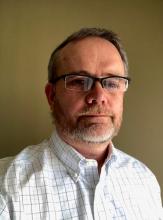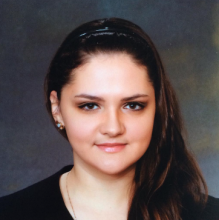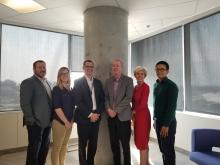Taran S. Wasson is currently with the Open Government team at the Treasury Board of Canada Secretariat and has worked in various federal government departments in a policy capacity. He joined the Open Government team in November 2016 and works on implementation. He previously worked at the Public Service Renewal Secretariat of the Privy Council Office where he advanced Blueprint 2020 including its guiding principle of being Open and Networked. He is happy to connect with like-minded professionals on Twitter @TaranWasson and LinkedIn.

On , Treasury Board of Canada Secretariat and the Canada School of the Public Service (the School) hosted an Armchair Discussion entitled “Open Government Starts with You”. For the first time in the history of the School’s Armchair Discussion the entire event was made open to the public via webcast in real time.
For those of you who weren’t able to join us, we wanted to share some of the highlights, outline the key advice from our experts, and provide information on where you can see the recorded session.
Behind the scenes
The Open Government team decided to organize the panel discussion in part to develop “Open Gov” skills across the Public Service, a task we committed to as part of Canada’s Third Biennial Plan. To support this commitment, we wanted to present distinct perspectives by experts in the field of Open Gov that would spark a lively discussion and provide examples of tangible actions and best practices, as “tools” that public servants can use.
We landed an amazing panel of speakers. This included Beth Noveck (Co-founder of Govlab, Professor, and former White House Open Gov lead), David Hume (Citizen Engagement, Province of BC) and Jean-Noé Landry (Executive Director, Open North). Our brand new Chief Information Officer of the Government of Canada, Alex Benay (on day 8 on the job!) agreed to moderate the panel. It helped that Alex is a true pioneer in open government circles, having established the first open-by-default museum in the world.
The main event
Many of us have heard that open government is good government. But for many people, the questions becomes “Sure, but how does it work? Is this a buzzword? And how do we get more government officials on board? How do I do it? Where do I start?”
Our panel aimed to answer some of these questions, but also to empower participants by providing them with tools and advice to facilitate an Open Gov shift in their organizations. The speakers were excellent, fed off one another, and together ignited an engaging conversation on mainstreaming Open Gov with tips and suggestions. Here are a few points I heard from each speaker:
Tools for advancing open government
Beth discussed key elements to strengthen to advance Open Government, including that:
- We should do a better job defining clear and actionable problems; too often, open government efforts are not oriented around specific problem solving which means that solutions aren’t always sufficiently targeted.
- We should create more participatory engagement.
- Using online platforms like Smarter Crowdsourcing is one way to move toward this.
Finally, she encouraged public servants to leverage the convening power of government and measure and map data from all sources.
Data trends
Jean-Noé Landry highlighted four key trends in open data:
- Data-smart communities: to make communities more data savvy, investments need to be made that are consistent with open data principles.
- Data sovereignty: with First Nations, the nation-to nation-relationship requires special attention to the issue of who owns and who is the steward of community data.
- Data ethics need to be carefully developed and include issues such as privacy.
- Data poverty: gaps in collecting and sharing data can make existing social inequality worse. These issues will shape the future of open data.
Reminders for public servants
David Hume shared some great reminders for public servants:
- We must consider the user experience and citizen concerns for Open Gov to be effective.
- Get outside the bubble to understand citizen needs and be able to give better advice.
- Public servants should become best friends with their legal and communications officials.
- Open government is a toolset that helps unearth value for the public and public servants.
The conversation online
A simultaneous discussion on Twitter occurred during the event and caught fire! Our English hashtag – #OpenGovCan – was trending number one in Ottawa and number 4 across Canada. Two of our presenters, Beth Noveck and David Hume were also trending in Ottawa.
For a sense of the excitement, check out the Storify of the conversation on Twitter.
Missed it?
This Armchair Discussion was recorded and is available as a Webcast.







